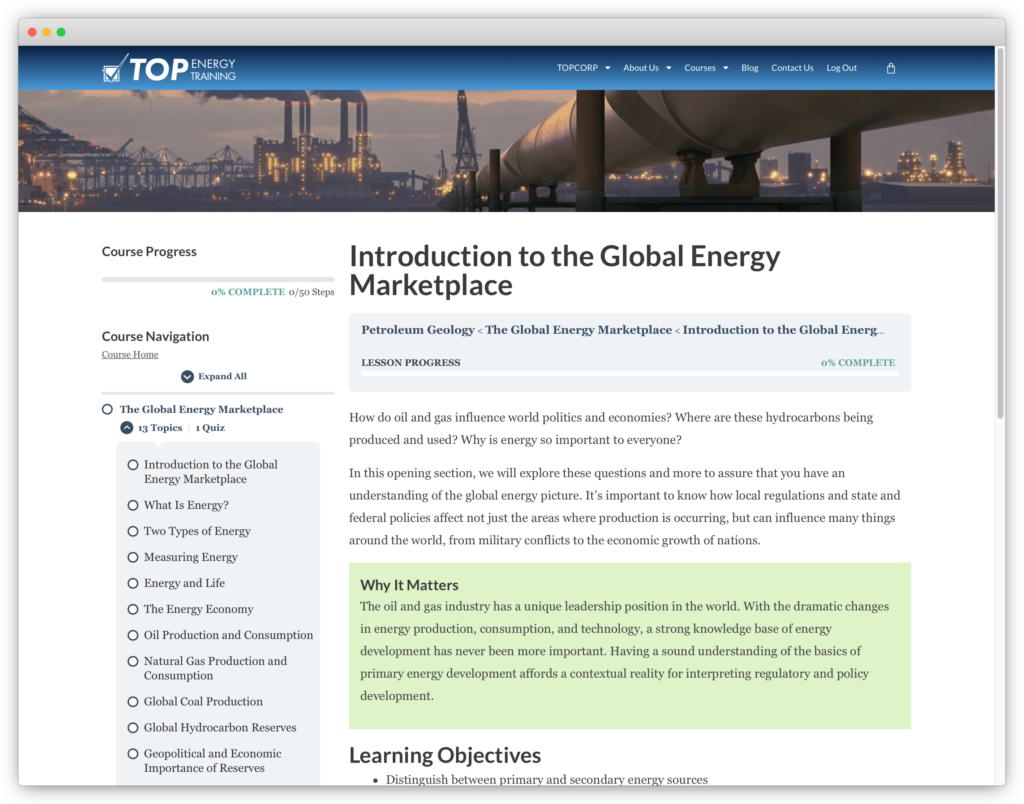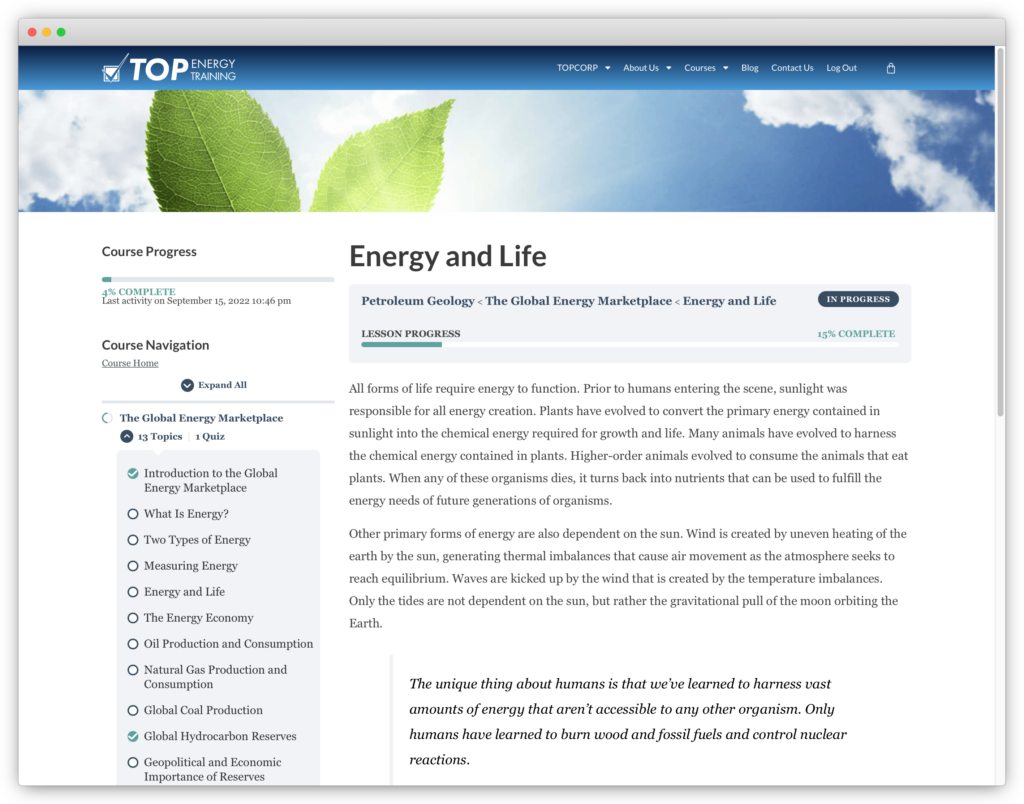Petroleum Geology: Full Course
6 Lessons • 44 Topics
Do you have business interests in the oil and natural gas industry? Maybe you’re looking to pursue a career in the industry? If so, you could benefit from TOP Energy Training’s online oil and gas training courses. We’ve designed our courses to educate students and industry professionals on the latest technology innovations, and we review our training courses regularly to stay up-to-date with the industry. In our Petroleum Geology Course, we cover the fundamentals of hydrocarbon exploration.
Not sure you want to invest in an entire course? Certain popular lessons are available for individual purchase. Take one of the course lessons to try it out. Your lesson cost can later be applied to the purchase of the full course if you like.
Petroleum Geology Course Content Overview
Before we look at the course overview, let’s understand what petroleum geology is. Petroleum geology refers to the study of the origin, migration, preservation, and location of petroleum resources. The discipline involves analyzing source rocks loaded with organic matter, geological structures, and sedimentary layers that allow petroleum accumulations to form in the subsurface, as well as the attributes of porous subsurface rock formations that store petroleum resources.
A petroleum geologist can pursue a career in the petroleum industry, state and federal government, or academics. Job opportunities exist in small and mid-size independent petroleum firms, major petroleum companies, national government laboratories, state geological surveys, universities, and high schools.
The faculty and researchers of the universities have put together an educational program that should serve as a shining example for others in industry, government, and the public. The program personifies what true environmental partnership is all about and what benefits it offers to all.
—Lucas Keeler, Inspection Specialist, Wyoming Oil and Gas Conservation Commission


Lessons from the course
Created in conjunction with TOP Energy Training’s highly qualified instructors, each lesson encompasses multiple topics to sharpen your knowledge and technical proficiency.

The Global Energy Marketplace
13 Topics
This lesson covers the fundamental aspects of energy and how it affects our everyday lives. The lesson will take you across various geopolitical landscapes and global energy resources and how they interact with today’s society. The lesson starts by defining energy and explains the primary types of energy. You’ll also learn about measuring energy and the supply and demand aspects of the global energy equation through interactive charts and graphs. Other topics covered in this lesson include Oil Production and Consumption, Natural Gas Production and Consumption, and Global Coal Production. By the time you’re through with this lesson, you’ll have an idea of the current situation and the future trends in the oil and gas industry.

The History of Extraction
4 Topics
Humans have been using natural products for heat and light for millennia. They started with resources that were easy to find and collect, like dung and wood, and gradually worked up to much more energy-dense resources like tight oil and shale gas that require great expense and time to acquire. This lesson in our Petroleum Geology Course takes you back to where it all started, walking you through the history of the oil and gas industry to today’s current situation. The lesson will introduce you to the concepts of extraction and combustion and explore a few case studies of oil fields, such as the East Texas Oil Field. The lesson ends with a brief look into oil and gas regulation.

Hydrocarbons and Petroleum Geology
6 Topics
The Earth is a dynamic system, millions of years old, whose surface is always changing and upon which organisms of untold multitudes have lived and died. The effects of weather, erosion, climatic changes, and tectonic movement, among many factors, have produced the world on which we all live today. The way this dynamic system has evolved is responsible for geological stores of hydrocarbons that humans now seek to extract and use to meet our energy demands. The Hydrocarbons and Petroleum Geology lesson introduces you to basic hydrocarbon chemistry, introductory overview of geology and the major types of rocks, stratigraphy, and sedimentary basin formation. You’ll also learn something about plate tectonics and its contribution to petroleum resources.

Petroleum Systems
5 Topics
This lesson takes you through essential elements necessary to understand the various aspects of a petroleum system. A petroleum system is a self-contained collection of geologic formations that has produced oil, allowed it to migrate, and trapped it in place until the present. Since each of these steps requires a very specific set of geologic conditions, complete petroleum systems are relatively uncommon. In this lesson, you’ll learn how geologists explore the earth to find such a perfect ordering of events for conventional and unconventional petroleum resources. Key concepts covered include the elements and processes of a petroleum system, such as source, reservoir, seal, trap, generation, migration, accumulation and preservation.

Hydrocarbon Exploration
12 Topics
This comprehensive lesson seeks to give you a basic understanding of the complex processes involved in searching for oil and natural gas resources. You’ll get a glimpse of the maps and data types that help geologists find key elements of a petroleum play, such as geological structures, that may eventually evolve into an exploration prospect. Some of the topics covered in this lesson include mapping, data collection and compilation, geological structures, geophysical techniques, and reserve estimation.

Leasing and Permitting
4 Topics
Once an exploration company has found a promising reservoir or decided to develop a well within an existing oil or gas play, it’s time to move on to the leasing and permitting stage of development. Leasing gives a company the property rights to extract oil and gas from the region of interest, while permitting gives the company legal rights to move forward with extraction operations. Various statutes and regulations govern leasing and permitting for oil and gas development in the United States. In this lesson of our Petroleum Geology Course, you’ll learn about various components of a lease, agencies that issue permits, the process for acquiring a permit, and other fundamental aspects of leasing and permitting.

